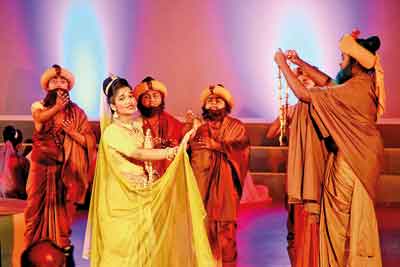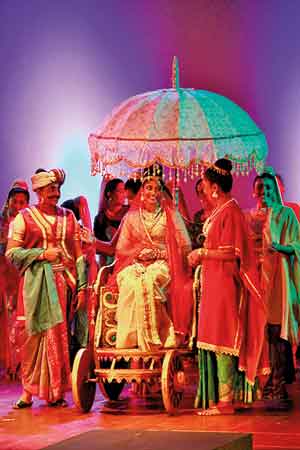‘Vishaka Situ Devi’: Passionate production comes under a cloud

Scenes from the play. Pix by Indika Handuwala
Vishaka Situ Devi’, a leading female figure in Buddhism, has over the centuries been the subject of much devotional literature. Known as one of the Buddha’s leading patrons, she has been hailed as the female embodiment of lay Buddhist virtues. Wanting her students to emulate this great figure, in 1958 the then Principal of Visakha Vidyalaya, Mrs. Susan George Pulimood commissioned well-known playwright Sri Chandraratna Manawasingha to write a play based on her life.
For its 100th anniversary celebrated this year, Visakha Vidyalaya, chose to once again stage Manawasingha’s ‘Visakha Geetha Natakaya’. The play, directed by K.B. Herath, took place on November 1 at the school’s Jeremias Dias Hall. Performed by the students and accompanied by a live orchestra, the musical was well executed with intricate costumes and props (which included a moving chariot) adding to the pageantry. What was most notable was that no ‘mics’ were used and though as a result, the soloists were not clearly audible at times when they turned their backs on the audience, overall the young cast managed to admirably project to the corners of the large hall. Their passionate performance which effectively communicated the message of the play overshadowed any slight issues with pitch and clarity.
At the end, Mrs. Kamala Kapilasena (nee Wadug-odapitiya), who had played the role of Migara in the original production was felicitated and she praised the production and its young actresses.
However, not all past students were overjoyed with the production. Some have been critical of what they see as the distortion of Manawasingha’s work by director K.B. Herath, accusing him of presenting Manawasingha’s work as his own, as well as altering the original play without the permission of the author’s heirs or that of the Foundation set up in his name.
Speaking to the Sunday Times, prior to the production, the Trustee of the Sri Chandraratna Manawasingha Foundation, Venerable Bellanwilla Wimalaratne Thera said the Foundation had learnt that Visakha Vidyalaya in celebration of their centenary was to stage a play which would contain songs from Sri Chandraratna Manawasingha’s works, presented as that of another. As a Foundation they morally opposed such a move, which he was keen to remind the public was also in contravention of the law. “Under the Intellectual Property Act, taking someone else’s work and presenting it as your own is disrespectful to the author, and against the law,” he stated. The Thera said the school should have either staged Manawasingha’s play as originally written and without derivation, or alternatively have staged a different play which wouldn’t have included parts of Manawasingha’s work.
 This however, was not the first time Manawasingha’s play has been altered. The play had been staged in 1958, 1959, and 1967, and was initially altered in the 1992 production when K. B. Herath directed the play for the first time. Herath who directed the 2007 and 2017 plays made further alterations for the sake of modernization as some have reported. The Sunday Times did note discrepancies between Manawasingha’s original script and this year’s production – the addition of songs, the omission and alteration of verses, although it still contained large segments of Manawasingha’s original verses and storyline.
This however, was not the first time Manawasingha’s play has been altered. The play had been staged in 1958, 1959, and 1967, and was initially altered in the 1992 production when K. B. Herath directed the play for the first time. Herath who directed the 2007 and 2017 plays made further alterations for the sake of modernization as some have reported. The Sunday Times did note discrepancies between Manawasingha’s original script and this year’s production – the addition of songs, the omission and alteration of verses, although it still contained large segments of Manawasingha’s original verses and storyline.
Responding to the criticism, the director, K. B. Herath explained that Manawasingha’s original play which was staged in 1958, 1959 and 1967, was initially made for radio and not visual theatre. A senior lecturer at the University of Visual and Performing Arts he said there was no play as such to speak of as it lacked any dramatic structure, and was written at a time when Sinhala theatre was still relatively young. When commissioned to take on the play in 1992, he told the school that he was unable to work with the script in its original form, and had made changes in order to make it compatible with modern theatre, which he noted was approved by the Old Girls Association at the time.
Having staged the adapted version for 25 years, which he directed pro bono, he believes the critics are merely nostalgic and don’t understand the need for change. The director maintains he received the script as well as permission to alter it from the school.
Alas, all the discussion and debate over the changes to the play resulted in an otherwise good production staged for the landmark occasion of the school’s centenary celebrations being marred by controversy.


